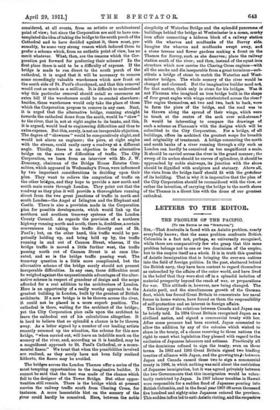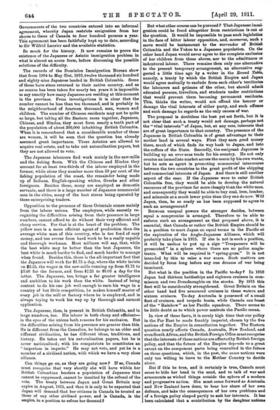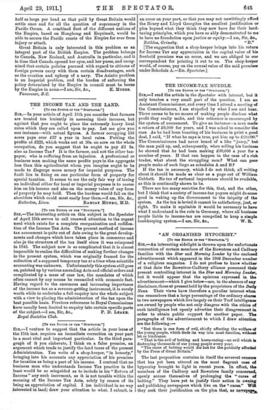LETTERS TO THE EDITOR.
THE PROBLEM OF THE PACIFIC.
[To TIM EDITOR 07 " SPLCRITOR."1
SIR,—That Australia is faced with an Asiatic problem, nearly everybody knows ; that the same problem confronts British Columbia is a fact not, perhaps, so universally recognised, while there are comparatively few who grasp that this same problem belongs not to one or two dominions of the empire, but to the empire itself as a whole. It is in truth this question of Asiatic immigration that is bringing the over-sea nations into the field of foreign politics. In the past, sheltered behind the British navy, they have been content to regard themselves as untouched by the affairs of the outer world, and have lived in the belief that they were shut off in a splendid isolation of material prosperity beyond the reach of war, or preparations for war. This attitude is, however, now being changed. The Asiatic peril, and the simultaneous growth of the German fleet, which has forced Great Britain to concentrate her naval forces in home waters, have forced on them the responsibility of self-protection and an interest in foreign affairs, The history of the relations between Canada and Japan can be briefly told. In 1894 Great Britain recognised Japan as a civilised nation, and signed a commercial treaty with her. After some pressure had been exerted, Japan consented to allow the addition by any of the colonies which wished to share in the treaty, of a clause reserving to those nations the right to enact what legislation they pleased with regard to the exclusion of Japanese labourers and artisans. Practically all of the dominions refused to sign the treaty, even on these terms. In 1902 and 1905 Great Britain signed two binding treaties of alliance with Japan, and the growing tra jr between Japan and Canada caused these two to sign a commercial treaty in 1906, in which nothing was said about the restriction of Japanese immigration, but it was agreed privately between the two Governments that this immigration would be volun- tarily restricted by Japan. In 1907 labour troubles in Hawaii were responsible for a sudden flood of Japanese pouring into British Columbia, and in the fiscal year 1907-08 seven thousand five hundred and eighty-nine Japanese entered the province. This sudden influx led to anti-Asiatic rioting, and the respective
Governments of the two countries entered into an informal agreement, whereby Japan restricts emigration from her shores to these of Canada to four hundred persons a year. This agreement has been faithfully kept up to date, according to Sir Wilfrid Laurier and the available statistics.
So much for the history. It now remains to prove the existence of the Japanese or Asiatic immigration problem in what is almost an acute form, before discussing the possible solutions of the difficulty.
The records of the Dominion Immigration Bureau show that from 1904 to May 31st, 1910, twelve thousand six hundred and eighty-nine Japanese landed in British Columbia. Some of these have since returned to their native country, and as no census has been taken for nearly ten years it is impossible to say exactly how many Japanese are residing at this moment in the province. From investigations it is clear that the number cannot be less than ten thousand, and is probably in the neighbourhood of fourteen thousand, men, women and children. The number of Chinese residents may not be quite so large, but taking all the Eastern races together, Japanese, Chinese, and Hindus, they must form nearly a tenth part of the population of about 300,000 inhabiting British Columbia. When it is remembered that a considerable number of these are women, it will be seen that the question has already assumed great importance. These Asiatics are allowed to acquire real estate, and to take out naturalisation papers, but they are not allowed to vote.
The Japanese labourers find work mainly in the saw-mills and the fishing fleets. With the Chinese and Hindus they account for at least two-thirds of the labour employed in the former, while alone they number more than 50 per cent. of the fishing population of the coast, the remainder being made up of Indiana, English-speaking whites, Greeks and other foreigners. Besides these, many are employed as domestic servants, and there is a large number of Japanese commercial men in the cities, many of the best stores being operated by these enterprising traders.
Opposition to the presence of these Orientals comes mainly from the labour unions. The employers, while secretly re- cognising the difficulties arising from their presence in large numbers, cannot afford to do without their very efficient and cheap service. For that is at the heart of the problem. The yellow man is a more efficient agent of production than the average white man of this country, who is too fond of easy money, and too averse from hard work to be a really capable and thorough workman. Most millmen will say, that, while the best white may be better than the best Japanese, the best white is much harder to find, and much harder to manage when found. Besides this, there is the all-important fact that the Japanese will work for $1.75 a day, where the white insists on $2.25, the wages in the saw-mills running up from $1.75 to $3.00 for the former, and from $2.25 to $8.00 a day for the latter. The Japanese, too, brings a far greater intelligence and ambition to his work than the white. Instead of being content to do his one job well enough to earn his wage in a country of but little competition, he makes himself master of every job in the mill or factory where be is employed, and is always trying to work his way up by thorough and earnest application.
The Japanese, then, is present in British Columbia, and in large numbers, too. His labour is both cheap and efficient— in the eyes of the unions both reasons for his exclusion. But the difficulties arising from his presence are greater than this. Re is different from the Canadian, he belongs to an older and different civilisation, he has different ideas, traditions, and history. He takes out his naturalisation papers, but he is never nationalised ; with his compatriots he constitutes an " imperium in imperio." He may not vote, and yet he is a member of a civilised nation, with which we have a very close alliance.
Can things go on, as they are going now P If so, Canada must recognise that very shortly she will have within her British Columbian borders a population of Japanese that cannot be suppressed, cannot be insulted by the refusal of the vote. The treaty between Japan and Great Britain may expire in August, 1915, and then it is only to be expected that Japan will demand that ber citizens in Canada be treated as those of any other civilised power, and is Canada, is the empire, in a position to refuse her demand P But what other course can be pursued P That Japanese immi- gration could be freed altogether from restrictions is out of the question. It would be impossible to pass such legislation in the face of bitter labour opposition, and, moreover, auch move would be tantamount to the surrender of British Columbia and the Yukon to a Japanese population. On the other hand Japan would never agree to the complete exclusion of her children from these shores, nor to the admittance at indentured labour. There remains then only one alternative to the present temporary arrangement, an alternative sug- gested a little time ago by a writer in the Round Table, namely, a treaty by which the British Empire and Japan would agree mutually to exclude from each other's territories the labourers and artisans of the other, but should admit educated persons, travellers, and students under restrictions that would prevent them becoming permanent residents. This, thinks the writer, would not offend the honour or damage the vital interests of either party, and such offence and such damage he regards as the only causes of war.
The proposal is doubtless the best yet set forth, but it is not clear that such a treaty would not damage, perhaps not the " vital interests" of Japan, but, at any rate, interests that are of great importance to that country. The presence of the Japanese in British Columbia is of great advantage to their mother land in several ways. First they earn good money there, much of which finds its way back to Japan, and into the coffers of the State. Secondly, the emigrant Japanese is building up an over-seas trade for his country. He not only creates an immediate market across the ocean by his own wants, but be acts as agent in promoting commercial intercourse between the two countries to the great profit of the shipping and commerical interests of Japan. And there is still another aspect of the case. If the Japanese were to enter British Columbia free, they would be able to develop the natural resources of the province far more cheaply than the white man, and consequently they would be able to buy coal, iron, lumber, and minerals at a much lower price than they can do now. Will Japan, then, be so ready as has been supposed to agree to such an arrangement P
Between unequal powers the stronger decides, between equal a compromise is arranged. Therefore to be able to enforce such an arrangement as that proposed above, it is essential, that Canada or rather the British Empire should be in a position to meet Japan on equal terms in the Pacific at the expiration of the Anglo-Japanese Alliance, which will probably take place in 1915. If she is not in such a position, it will be useless to put up a sign " Trespassers will be prosecuted" in a sphere where there are no police magis- trates. What will be required is " spring-guns." It is not intended by this to raise a war scare. Such matters are decided by force long before auy one dreams of war being imminent.
But what is the position in the Pacific to-day P In 1910 Japan had thirteen battleships and eighteen cruisers in com- mission and two Dreadnoughts on the stocks. By 1915 this fleet will be considerably strengthened. Great Britain on the other hand had five armoured cruisers in these waters and sixteen cruisers. To-day Australia is possessed of a small fleet of cruisers, and torpedo boats, while Canada can boast of the " Rainbow" as her Pacific squadron. There seems to be little doubt as to which power controls the Pacific ocean.
In view of these facts, it is surely high time that our policy in the Far East be made frankly imperial, chosen by the five nations of the Empire in consultation together. The Eastern question nearly affects Canada, Australia, New Zealand, and even South Africa, and the British Foreign Office must recognise that the interests of these nations are affected by British foreign policy, and that the future of the Empire depends to a great extent on the component parts being consulted in the future on these questions, which, in the past, the same nations were only too willing to leave to the Mother Country to decide alone.
But if this be true, and it certainly is true, Canada must cease to hide her head in the sand, and to talk of war and armaments as wicked things outside the sphere of a modern and progressive nation. She must come forward as Australia and New Zealand have done, to bear her share of her own defence, and take the consequences of her own problems and of a foreign policy shaped partly to suit her interests. It has been calculated that a contribution by the daughter nations
half as large per head as that paid by Great Britain would settle once and for all the question of supremacy in the Pacific Ocean. A combined fleet of the different nations of the Empire, based on Hongkong and Esquimalt, would be able to secure the Pacific coasts of the Empire for ever from injury or attack.
Great Britain is only interested in this problem as an integral part of the British Empire. The problem belongs to Canada, New Zealand, and Australia in particular, and it is time that Canada opened her eyes, and her purse, and recog- nised that certain policies pursued with regard to citizens of foreign powers carry with them certain disadvantages, such as the creation and upkeep of a navy. The Asiatic problem is an Imperial problem, and the burden of enforcing the policy determined by the Empire in council must be borne
by the Empire in arms.—I am, Sir, &c., S. MvEas. Vancouver, B.C.




























































 Previous page
Previous page